1st September 2016 Khartoum
Darfur: A green and pleasant land
Darfur: A green and pleasant land
Last month I visited Darfur for the first time. My first impression was how green and beautiful Darfur is. We flew to Nyala via El Geneina in West Darfur and flying over Darfur I was amazed how green the countryside is at this time of year. Driving along the road out of Nyala towards the Central African Republic the terrain becomes rich savannah, with lush pasture and extraordinary baobab trees. Everywhere there are farmers (mostly women) working in the fields, hoeing, carrying water and transporting crops on donkeys. I know that this green season is comparatively short but seeing the countryside so fertile and productive helped me understand the importance of the land to all Darfuris and why land and water have been the cause of so many disputes over the years. South Darfur has not yet suffered the desertification which is creeping through North Darfur but the consequences of climate change have impacted on the lives of both nomads and pastoralists and have contributed to conflict.
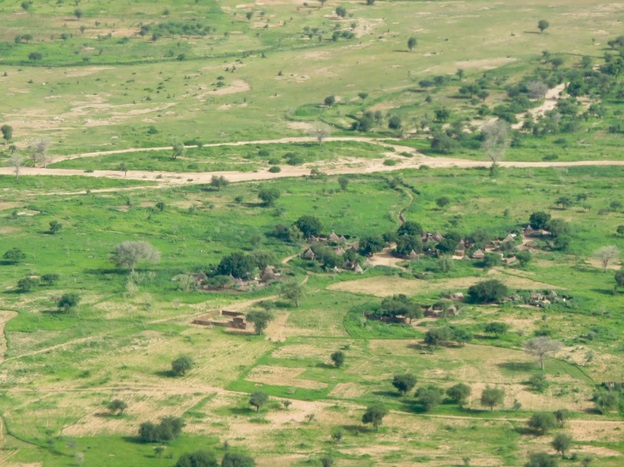
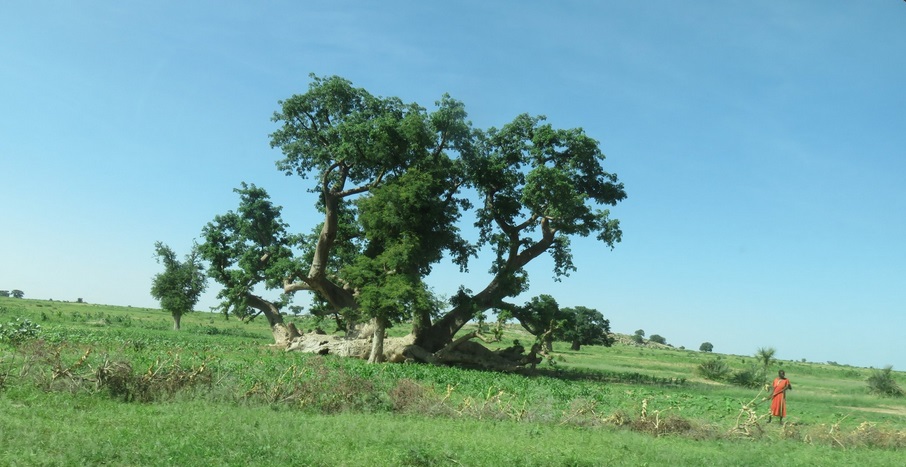
The Darfur Community Peace and Stability Fund (DCPSF)
During my visit I was able to see how the UNDP-run DCPSF (the UK is the fund’s largest donor) has managed to work with local communities to support peace building, help deliver local services and enhance livelihoods. Since 2008 the DCPSF has been working with implementing partners to help establish Community Based Reconciliation Mechanisms made up of tribal leaders as well as representatives of youth and women’s groups.
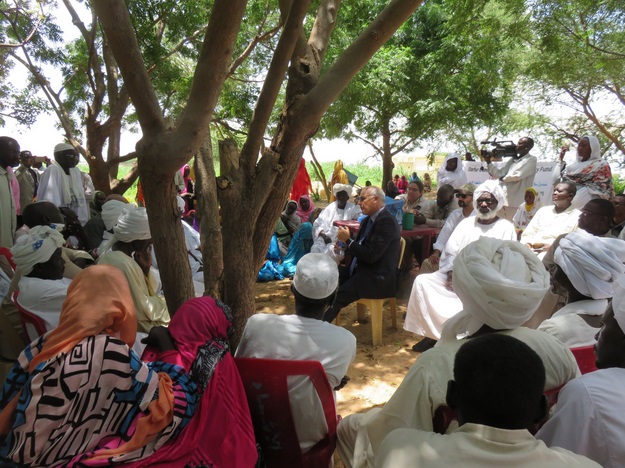
A typical DCPSF funded project works with the local community in an area that has experienced conflict, often between nomads and pastoralists, identifying the causes of the conflict and working with the local leaders to come up with solutions. Often this will involve providing a service, such as a well or improvements to a dam, which benefits all members of the community and gives them a shared interest in cooperating rather than fighting.
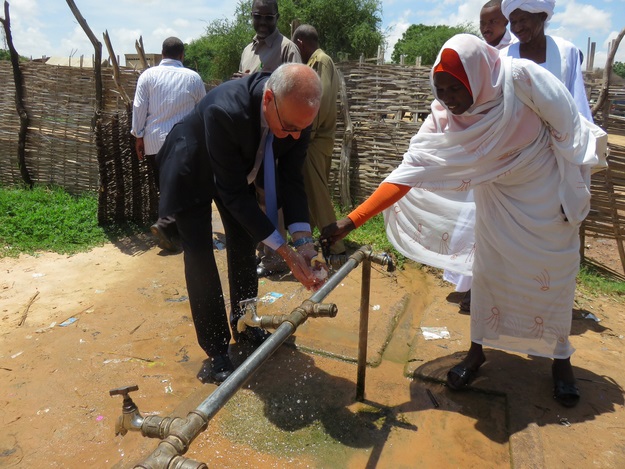
In Beleil we saw a well which benefitted both the local community and the local IDP camp; a school provided with new seating and desks, which served children from all the local tribes; and a women’s centre which was being used for a training course on environmental awareness when we visited – all funded by different DCPSF projects. In Yawyaw we met a peace committee including tribal sheikhs representing both nomads and farmers. A migratory route had been demarcated so that it was clear which path the nomads’ animals should use and where the farmers should plant their crops. Hopefully this will minimise future problems.
Security is getting better
Both Adam Elfaky, the Wali of South Darfur, and Berhanemeskel Nega, the head of UNAMID in Nyala, told me how much the security situation in South Darfur had improved over the last year, particularly in Nyala. Both agreed that there were no longer any rebel groups operating in South Darfur. The Wali emphasised the importance of implementing the disarmament programme. Visible weapons had been banned in Nyala from all but the police and the army; incentives would be offered to individuals to give up their weapons; in the final stages houses would be searched for people who tried to keep their weapons. But the Wali acknowledged that some people were frightened to give up their weapons because they feared being attacked by armed groups.
But UNAMID is still needed
UNAMID said there had been no instances of attacks on their operations in South Darfur in 2016 – previously carjacking had been a serious problem, but the security situation was now much better, although they continued to provide heavy protection for movements of goods around the state (and for my visit). Discussions throughout my visit underlined the vital role that UNAMID continues to play in Darfur, particularly in the protection of civilians and the provision of humanitarian escorts. UNAMID is still needed in Darfur and the United Nations Security Council unanimously extended the mission’s mandate and tied any future change to benchmarks based on tangible improvements in three areas: peace and political settlement, protection of civilians and unhindered humanitarian access, and an end to community conflict. I very much hope that these improvements can be realised so that UNAMID’s mandate can be successfully completed – I know that the Government of Sudan want this too.
Life in the camps is tough
During my stay I visited Otash IDP Camp. I also drove through El Salam Camp and drove past Kalma and Beleil Camps. Hundreds of thousands of internally displaced people are living in extremely difficult conditions in these camps, many of them for the last 13 years. Most of the children have known no other home. The World Food Programme, with support from DFID, are doing a great job supporting the poorest and most vulnerable IDPs and coming up with new and better ways of providing support – in Gereida camp they use electronic cards and in Otash they use a voucher system, and in November they will be starting a trial of cash payments. But even the most vulnerable families only get SDG55 (about £10) per person a month – not enough to cover all their needs.
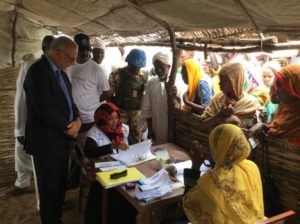
Speaking to a group of women leaders in Otash I heard why they do not want to return to their villages. In some cases their villages no longer exist or have been occupied by other tribes. And in any case they are understandably worried about their security if they return. In some cases IDPs are returning to their farms during the growing season to plant and harvest crops but remain in the camps the rest of the year, partly because the necessary services (schools, health centres) are not available outside the camps. I was told that for many in the camps their camp identity card is a form of security which they are very unwilling to give up.
A dignified way forward for the IDPs is badly needed
Experience of IDP camps elsewhere in the world suggests that camps can take on a life of their own and finding sustainable solutions so that IDPs can choose to return home or live elsewhere is always difficult. The Government of Sudan would like to close the camps as soon as possible and finding solutions for the IDPs in line with humanitarian principles is in everyone’s best interests. But this isn’t straightforward given the history of the last 13 years and it can only be achieved with the agreement of the IDPs themselves. In addition, the opposition political leadership should not use the IDPs as pawns for their political goals.
Global standards say that IDPs must be given a choice if they are able to leave a camp – either return to their original village; resettlement elsewhere in the country; or be given alternative accommodation near the camp. As security in the State hopefully continues to improve more should be able to return to their original villages (if they still exist and aren’t occupied) but they will still need schools and health centres to be available. With Qatar Charity, I visited a Service Centre they had funded in Bulbul, 50km South West of Nyala, which provides primary and secondary schools for boys and girls as well as a health centre and a police station. Qatar Charity have funded five such centres across Darfur and more are planned, which should help IDPs to return to their homes provided they are carefully planned in consultation with the IDPs and situated in the right places.
But some IDPs may not want to return to their original villages. Young people are moving from the countryside to towns and cities across Africa and Darfuris are no different. Former DRA Head Tijani Sisi and the Wali agree that houses outside the camps, with the necessary services, should be provided in the suburbs of Nyala and other towns for those IDPs who would prefer this solution. This should not require them to give up their rights to their farmland in their original areas or to compensation. But it will require significant funding, serious commitment from the Government and the confidence and trust of the IDPs concerned.
Above all peace is essential
Everyone I spoke to wanted peace and hoped that the negotiations in Addis Ababa would resume and conclude successfully. I didn’t visit Kalma Camp but just after I left the leaders of Kalma sent a letter to UNAMID rejecting the African Union Roadmap (many in Kalma support Abdul Wahid Nur who has refused to engage in negotiations with the Government of Sudan). I hope that Abdul Wahid can be persuaded to join Minni Minnawi and Gibril Ibrahim in signing the Roadmap, which offers the best way towards peace in Darfur. In the meantime the British Government will continue to support the African Union Panel in its work and encourage the Government of Sudan and the rebel groups to reach agreement on a cessation of hostilities and humanitarian access as soon as possible.
I remain optimistic
Despite the terrible history of the last 13 years and the continuing problems I remain optimistic about the future of Darfur. The region has abundant natural resources. The people of Darfur, men and women, young and old, farmers and nomads, ‘Arabs’ and ‘Africans’, in the camps and outside, all seem determined to re-establish peace. Security, still not perfect, is improving. Reconciliation efforts, including those supported by the DCPSF, are making headway. The Government of Sudan and two of the rebel groups have signed the AUHIP Roadmap. The international community, including the United Kingdom and Qatar, are committed to help and ready to provide humanitarian, early recovery and development assistance to support Darfur’s future.
Thanks to UNDP, UNAMID and the Wali
I am very grateful to Erin Cornish and her colleagues at UNDP for arranging this very useful visit for me and my colleague Ishtiaq Ghafoor, to UNAMID for hosting us at their Supercamp, to the Wali and Humanitarian Aid Commissioner of South Darfur for their support and cooperation, and to everyone we met for helping me understand a little bit better this complex and important region in the heart of Africa.

These are words by someone who went with an open mind and goodwill.Darfur is not yet “perfect” but there is no comparison to the 2003 days of conflict.The Darfur rebels are now a regional not only Sudanese problem.They fight in Libya and South Sudan as mercenaries who have negligible foothold inside Darfur.
The real challenge now is to deliver infrastructure reconstruction and development projects. What the Darfur Regional Authority has achieved is laudable and should provide basis for continued efforts to remove the root causes of grievances and friction.
يبدو من الملاحظات التي خرج بها السيد السفير البريطاني من زيارته لجنوب دار فور انها كانت موفقة.. من خلال لقاءاته بوالي الولاية ورئاسة اليوناميد وبالقائمين علي امر صندوق دارفور للاستقرار والسلام الاجتماعي، نجد ان الجميع اكدوا انهم بحاجة الي السلام ويناشدون جميع الاطراف الاسراع للوصول الي سلام دائموهذا هو بيت القصيد.. كراي شخصي المسالة السياسية بين المعارضة والحكومة مقدور عليها في ي اي لحظة بموجب اتفاق بين الطرفين.. لكن المشكلة في النسيج الاجتماعي المتهتك بين مكونات دارفور. .. هذا سفك دم هذا وهذا اكل مال هذا.. والسلاح المنتشر في ايدي المواطنين.، كيف ومتى يتم جمعه؟ ويكون السلاح فقط عند الحكومة.. لا حركات ولا مليشيات ولا مواطنين عاديين.. عند ذلك فقط يكون السلام واقعا معاشا ويستتب الامن وتكون ارض دارفور خضراء جميلة بصفة دائمة…
While of course Darfur is more than the sum of the conflict it’s been host to over the past 13 years, and while it’s welcome to hear about DCPSF peace building initiatives, it is irresponsible for Ambassador Aron to write “Security, still not perfect, is improving” while failing to mention the surge in violence in the more northerly Jebel Marra region, which the UN says has displaced up to nearly 200,000 people since mid-January just this year: http://bit.ly/2c65DJS
Similarly, while thankfully Ambassador Aron’s visit to Otash IDP camp has at this stage not resulted in arrests for those he spoke with, many who met with US Special Envoy Donald Booth from Nertiti IDP camp in July remain imprisoned, having been held incommunicado and subjected to ill treatment and quite likely torture. Whether this is because they chose to convey the reality of life for camp residents – in the words of the Darfur Bar Association “the killings, rapes, detentions, and torture by the government and its militias, and the occupation of their land by new settlers” – I’ll leave to readers to decide.
Racism ,always stand out among the conflicts over scarce resources.
No comment right now but is all good as what u say?
It comes into mind that how this green land’s productive population has been stoped from gaining the benefits from their land due to the armed conflict, which need more pressure to the parts to the conflict to realize sustainable peace that makes an end to the suffering of the war victims.
حديث جميل وواقعي ﻻنسان زار دارفور والتحدي يبقي في القضاء علي التخلف والنزاعات ﻻن التنمية مفتاح النجاح و السﻻم في دارفور
Ambassador Aron’s visit to South Darfur was very timely and appreciated by all, including UNAMID. During his visit, he was able to see first hand developments on the ground, meet key actors and visit important locations, including IDP camps, return areas and donor – supported projects in the state.
As Ambassador Aron rightly observed, over the past year, we have witnessed encouraging progress towards stabilization of South Darfur, mainly due to a very practice role played by the Wali of the state and the support of UNAMID. While there are no armed groups operating in the state, inter-communal conflicts still pose a challenge. However, good progress is also being made with several agreements signed to resolve these conflicts peacefully. The Shattaya agreement is one of those signed recently, and Ambassador Aron also met with the signatories. This agreement, among other things, will ensure the return of land forcibly occupied by some tribes to the rightful owners, forced to leave and currently staying in camps across the state, and enable their return to this area. UNAMID is working with the state government and all concerned parties in supporting the implementation of the agreement.